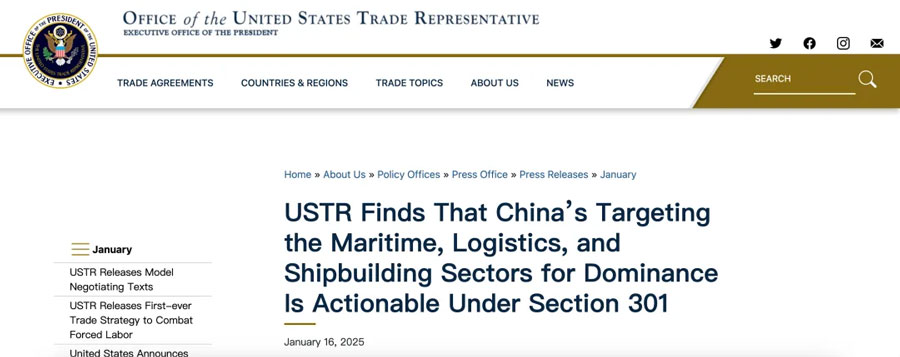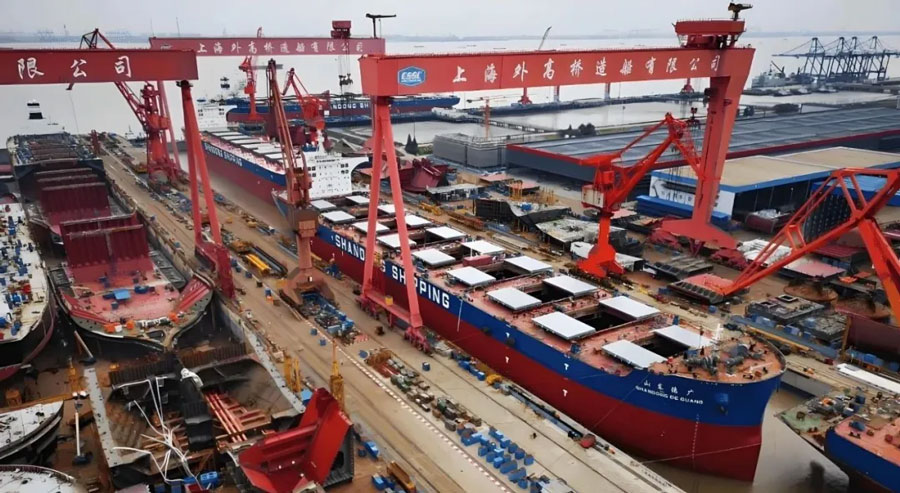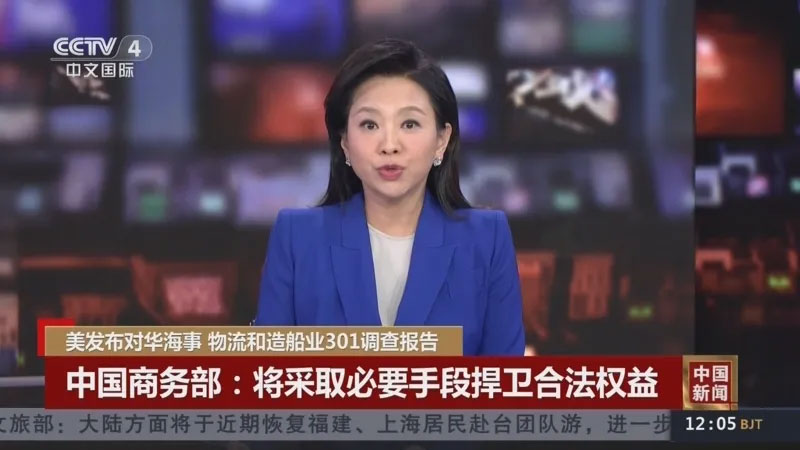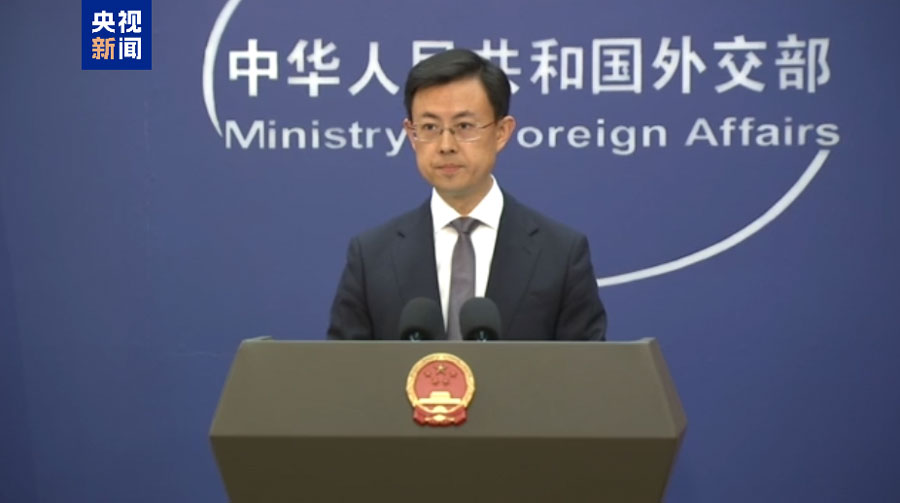

Us imposes 200% tariffs on China, Ministry of Commerce responds
A 200% tariff on ships repaired by Chinese shipyards? On the eve of the change of the US government, the results of the 301 investigation launched by the Biden administration against China's maritime, logistics and shipbuilding industries were officially released, creating new conditions for the proposed "US Ships Act" to crack down on China's shipbuilding industry.
On January 16, the Office of the United States Trade Representative (USTR) released a Section 301 investigation report on China's maritime, logistics and shipbuilding industries, concluding that China's targeted dominance in these areas is unreasonable and burdens or restricts US commerce. The Biden administration has recently issued a series of economic and trade restrictions on China. On January 17, the spokesperson of the Ministry of Commerce and the Ministry of Foreign Affairs of China responded by refuting the report of the 301 investigation of the United States, which is full of "false accusations" against China.
"Today, the United States ranks 19th in the world in commercial shipbuilding, and we build fewer than five ships per year, while China builds more than 1,700 ships per year," the report states. In 1975, the United States was number one, and we were building more than 70 ships a year."
In the report, the USTR concluded that China has been actively seeking dominance in the maritime, logistics and shipbuilding sectors and has set a series of increasingly aggressive and specific targets. China has largely achieved its dominant goals, and this behavior has severely harmed American companies, workers, and the U.S. economy as a whole. Specifically, China poses a security risk to the U.S. economy by reducing market competition and business opportunities, and by exploiting dependence and vulnerability.
In addition, the report states that more than 80% of the world's goods are shipped by sea. In 2022, for example, 44.6% of the United States' internationally traded goods by value (about $2.3 trillion) and 78.6% by weight (about 1.6 billion tons) are shipped by sea. In particular, maritime transport is responsible for 61% of internationally traded goods (by value) between the United States and Asia and 45% of internationally traded goods (by value) between the United States and Europe. As a result, USTR believes that China's growing influence in areas such as the commercial fleet could impose additional burdens or constraints on U.S. businesses and the economy. Therefore, lawsuits can be brought against China under Section 301.
In March of last year, the United Steelworkers (USW), led by four other unions, filed a petition with the office of U.S. Trade Representative Mary Deitch. The petition calls for an in-depth investigation into alleged "unfair" policies and practices in China's maritime logistics and shipbuilding industries. The petition makes it clear that China's leading position in the global shipbuilding, maritime and logistics industries is based on a series of non-market policies that are more aggressive and intrusive than those of other countries or regions.
The petition further proposes that, in response to China's dominant position in this sector, the U.S. government should impose port fees of up to $1 million on Chinese-built ships calling in the United States and use the fees to create a special fund to revive the U.S. shipbuilding industry. At the same time, the petition also recommends that the administration take all other actions within the power of the president to increase the demand for U.S.-built ships, such as requiring U.S. exports of LNG, fuel oil, etc. to be shipped on U.S.-built liquid cargo ships.
It is worth noting that the 301 investigation once became the "last weapon" of the United States to deal with trade frictions with other countries. However, since the creation of the World Trade Organization (WTO) in 1994, the number and frequency of cases in which the United States has initiated unilateral sanctions has decreased significantly. Still, industry insiders believe that the survey report provides the incoming administration (the original reference to the Trump administration here, but given the timeline, should be a potential administration after the Biden administration or specific policy tendencies within the Biden administration) with a new weapon against China. And could pave the way for union demands for tariffs or port fees on Chinese-built ships.
In fact, the Biden administration has largely continued the Trump-era tariff policies and imposed new tariffs on Chinese goods such as electric vehicles, while imposing a series of export controls on China to further weaken China's trade dominance. The United States and other Western countries have accused China of pursuing aggressive industrial policies and overproducing commodities such as steel. In this context, there is also a rare bipartisan agreement on the need to rectify and revitalize the U.S. shipbuilding industry.
Last December, both parties formally introduced a new piece of legislation in Congress, the Ships for America Act. The bill aims to pass a series of measures, including a 200% tariff on maintenance work done by shipyards in "countries of concern" such as China, although China is not directly mentioned in the provisions, but the main speaker, Democratic Senator Mark Kelly, made clear in a fact sheet that this refers to China.
Kelly said the 200 percent tariff could make it very expensive to repair U.S.-flagged ships in China, and that a $3 million repair bill would mean a $6 million payment to the U.S. Treasury after the 200 percent tariff, assuming the ship is repaired at a Chinese shipyard. Under the proposed U.S. Ships Act, these tariff revenues would likely go into a dedicated fund to promote the further development of U.S. merchant shipping and the U.S. shipbuilding industry. And raising tariffs on other shipbuilding countries from 50 percent to 70 percent to revitalize the U.S. shipbuilding industry and challenge China's dominance of the global shipbuilding industry.
In response, the spokesperson of the Ministry of Commerce said that on January 15, the Biden administration once again sanctioned a number of Chinese enterprises, and released the 301 investigation report on China's maritime, logistics and shipbuilding industry on January 16, the United States time. China is strongly dissatisfied with and firmly opposed to this.
Regarding the Section 301 investigation, the Chinese side stressed that the relevant investigation has obvious unilateralism and protectionism. The 301 tariffs imposed by the US on China have been ruled by the WTO to be in violation of WTO rules and faced opposition from many WTO members.
The US Section 301 investigation report on China's maritime, logistics and shipbuilding industries is full of false accusations against China. Historically, the decline of the US shipbuilding industry has nothing to do with China. Even before the rise of China's shipbuilding industry, the global market share of the U.S. shipbuilding industry was negligible. In reality, the development of China's shipbuilding industry definitely does not rely on so-called "non-market practices", but relies on a complete industrial system, well-trained engineers and industrial workers, and an open business environment. China's maritime market has always been open to the global market and has never adopted discriminatory policies against foreign ships and foreign companies. China's industrial policy is mainly guiding, not mandatory, and treats both Chinese and foreign companies equally.
China urges the Biden administration to respect facts and multilateral rules, abide by the principles of market economy and fair competition, take seriously the legitimate concerns and legitimate demands of enterprises of the two countries, and stop shifting industrial development issues in the United States to China. China will closely follow the moves of the US and take necessary measures to safeguard its legitimate rights and interests.
On January 17, a spokesperson of the Foreign Ministry answered questions at a regular press conference on the US release of the Section 301 investigation report on China's maritime, logistics and shipbuilding industries.
The development of China's related industries is the result of technological innovation and active participation in market competition, benefiting from its own complete industrial manufacturing system and huge domestic market. The Biden administration's blaming China for its own problems runs counter to both factual and economic common sense. We urge the US to respect the facts and multilateral rules, immediately stop its wrong practices and return to the rules-based multilateral trading system. China will closely follow the progress of the investigation and will take all necessary measures to resolutely safeguard its own rights and interests.
On January 16, the Office of the United States Trade Representative (USTR) released a Section 301 investigation report on China's maritime, logistics and shipbuilding industries, concluding that China's targeted dominance in these areas is unreasonable and burdens or restricts US commerce. The Biden administration has recently issued a series of economic and trade restrictions on China. On January 17, the spokesperson of the Ministry of Commerce and the Ministry of Foreign Affairs of China responded by refuting the report of the 301 investigation of the United States, which is full of "false accusations" against China.

"Today, the United States ranks 19th in the world in commercial shipbuilding, and we build fewer than five ships per year, while China builds more than 1,700 ships per year," the report states. In 1975, the United States was number one, and we were building more than 70 ships a year."
In the report, the USTR concluded that China has been actively seeking dominance in the maritime, logistics and shipbuilding sectors and has set a series of increasingly aggressive and specific targets. China has largely achieved its dominant goals, and this behavior has severely harmed American companies, workers, and the U.S. economy as a whole. Specifically, China poses a security risk to the U.S. economy by reducing market competition and business opportunities, and by exploiting dependence and vulnerability.
In addition, the report states that more than 80% of the world's goods are shipped by sea. In 2022, for example, 44.6% of the United States' internationally traded goods by value (about $2.3 trillion) and 78.6% by weight (about 1.6 billion tons) are shipped by sea. In particular, maritime transport is responsible for 61% of internationally traded goods (by value) between the United States and Asia and 45% of internationally traded goods (by value) between the United States and Europe. As a result, USTR believes that China's growing influence in areas such as the commercial fleet could impose additional burdens or constraints on U.S. businesses and the economy. Therefore, lawsuits can be brought against China under Section 301.
In March of last year, the United Steelworkers (USW), led by four other unions, filed a petition with the office of U.S. Trade Representative Mary Deitch. The petition calls for an in-depth investigation into alleged "unfair" policies and practices in China's maritime logistics and shipbuilding industries. The petition makes it clear that China's leading position in the global shipbuilding, maritime and logistics industries is based on a series of non-market policies that are more aggressive and intrusive than those of other countries or regions.
The petition further proposes that, in response to China's dominant position in this sector, the U.S. government should impose port fees of up to $1 million on Chinese-built ships calling in the United States and use the fees to create a special fund to revive the U.S. shipbuilding industry. At the same time, the petition also recommends that the administration take all other actions within the power of the president to increase the demand for U.S.-built ships, such as requiring U.S. exports of LNG, fuel oil, etc. to be shipped on U.S.-built liquid cargo ships.

It is worth noting that the 301 investigation once became the "last weapon" of the United States to deal with trade frictions with other countries. However, since the creation of the World Trade Organization (WTO) in 1994, the number and frequency of cases in which the United States has initiated unilateral sanctions has decreased significantly. Still, industry insiders believe that the survey report provides the incoming administration (the original reference to the Trump administration here, but given the timeline, should be a potential administration after the Biden administration or specific policy tendencies within the Biden administration) with a new weapon against China. And could pave the way for union demands for tariffs or port fees on Chinese-built ships.
In fact, the Biden administration has largely continued the Trump-era tariff policies and imposed new tariffs on Chinese goods such as electric vehicles, while imposing a series of export controls on China to further weaken China's trade dominance. The United States and other Western countries have accused China of pursuing aggressive industrial policies and overproducing commodities such as steel. In this context, there is also a rare bipartisan agreement on the need to rectify and revitalize the U.S. shipbuilding industry.
Last December, both parties formally introduced a new piece of legislation in Congress, the Ships for America Act. The bill aims to pass a series of measures, including a 200% tariff on maintenance work done by shipyards in "countries of concern" such as China, although China is not directly mentioned in the provisions, but the main speaker, Democratic Senator Mark Kelly, made clear in a fact sheet that this refers to China.
Kelly said the 200 percent tariff could make it very expensive to repair U.S.-flagged ships in China, and that a $3 million repair bill would mean a $6 million payment to the U.S. Treasury after the 200 percent tariff, assuming the ship is repaired at a Chinese shipyard. Under the proposed U.S. Ships Act, these tariff revenues would likely go into a dedicated fund to promote the further development of U.S. merchant shipping and the U.S. shipbuilding industry. And raising tariffs on other shipbuilding countries from 50 percent to 70 percent to revitalize the U.S. shipbuilding industry and challenge China's dominance of the global shipbuilding industry.
In response, the spokesperson of the Ministry of Commerce said that on January 15, the Biden administration once again sanctioned a number of Chinese enterprises, and released the 301 investigation report on China's maritime, logistics and shipbuilding industry on January 16, the United States time. China is strongly dissatisfied with and firmly opposed to this.
Regarding the Section 301 investigation, the Chinese side stressed that the relevant investigation has obvious unilateralism and protectionism. The 301 tariffs imposed by the US on China have been ruled by the WTO to be in violation of WTO rules and faced opposition from many WTO members.
The US Section 301 investigation report on China's maritime, logistics and shipbuilding industries is full of false accusations against China. Historically, the decline of the US shipbuilding industry has nothing to do with China. Even before the rise of China's shipbuilding industry, the global market share of the U.S. shipbuilding industry was negligible. In reality, the development of China's shipbuilding industry definitely does not rely on so-called "non-market practices", but relies on a complete industrial system, well-trained engineers and industrial workers, and an open business environment. China's maritime market has always been open to the global market and has never adopted discriminatory policies against foreign ships and foreign companies. China's industrial policy is mainly guiding, not mandatory, and treats both Chinese and foreign companies equally.

China urges the Biden administration to respect facts and multilateral rules, abide by the principles of market economy and fair competition, take seriously the legitimate concerns and legitimate demands of enterprises of the two countries, and stop shifting industrial development issues in the United States to China. China will closely follow the moves of the US and take necessary measures to safeguard its legitimate rights and interests.
On January 17, a spokesperson of the Foreign Ministry answered questions at a regular press conference on the US release of the Section 301 investigation report on China's maritime, logistics and shipbuilding industries.

The development of China's related industries is the result of technological innovation and active participation in market competition, benefiting from its own complete industrial manufacturing system and huge domestic market. The Biden administration's blaming China for its own problems runs counter to both factual and economic common sense. We urge the US to respect the facts and multilateral rules, immediately stop its wrong practices and return to the rules-based multilateral trading system. China will closely follow the progress of the investigation and will take all necessary measures to resolutely safeguard its own rights and interests.





